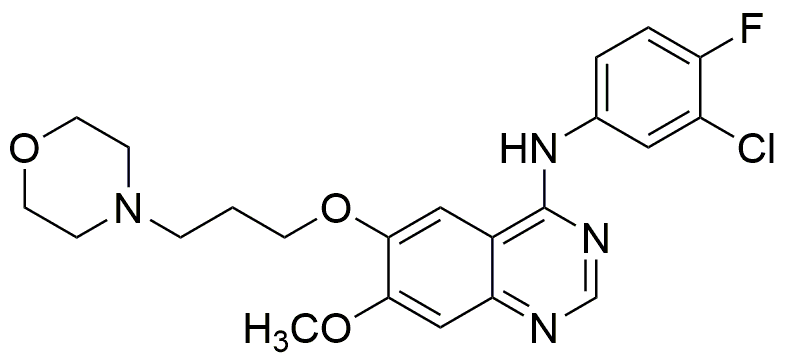Gefitinib is widely utilized in research focused on:
- Targeted Cancer Therapy: Primarily used in the treatment of non-small cell lung cancer (NSCLC), Gefitinib inhibits specific growth factor receptors, leading to reduced tumor growth and improved patient outcomes.
- Personalized Medicine: Its application in genetic testing allows healthcare providers to tailor treatments based on the presence of specific mutations in patients, enhancing treatment efficacy and minimizing side effects.
- Combination Therapy Research: Researchers are exploring Gefitinib's effectiveness when combined with other cancer treatments, potentially improving overall survival rates and reducing resistance in cancer cells.
- Pharmaceutical Development: The compound serves as a model for developing new anti-cancer drugs, providing insights into drug design and the mechanisms of action against similar tumors.
- Clinical Trials: Gefitinib is frequently involved in clinical studies aimed at understanding its long-term effects and potential benefits in various cancer types, contributing to the advancement of oncological therapies.
Informations générales
Propriétés
Sécurité et réglementation
Applications
Gefitinib is widely utilized in research focused on:
- Targeted Cancer Therapy: Primarily used in the treatment of non-small cell lung cancer (NSCLC), Gefitinib inhibits specific growth factor receptors, leading to reduced tumor growth and improved patient outcomes.
- Personalized Medicine: Its application in genetic testing allows healthcare providers to tailor treatments based on the presence of specific mutations in patients, enhancing treatment efficacy and minimizing side effects.
- Combination Therapy Research: Researchers are exploring Gefitinib's effectiveness when combined with other cancer treatments, potentially improving overall survival rates and reducing resistance in cancer cells.
- Pharmaceutical Development: The compound serves as a model for developing new anti-cancer drugs, providing insights into drug design and the mechanisms of action against similar tumors.
- Clinical Trials: Gefitinib is frequently involved in clinical studies aimed at understanding its long-term effects and potential benefits in various cancer types, contributing to the advancement of oncological therapies.
Documents
Fiches de données de sécurité (FDS)
La FDS fournit des informations de sécurité complètes sur la manipulation, le stockage et l’élimination du produit.
Spécifications du produit (PS)
Le PS fournit une description complète des propriétés du produit, notamment sa composition chimique, son état physique, sa pureté et les exigences de stockage. Il détaille également les plages de qualité acceptables et les applications prévues du produit.
Certificats d'analyse (COA)
Recherchez des certificats d'analyse (COA) en saisissant le numéro de lot du produit. Les numéros de lot et de lot se trouvent sur l'étiquette d'un produit, après les mots « Lot » ou « Lot de fabrication ».
Numéro de catalogue
Numéro de lot/série
Certificats d'origine (COO)
Ce certificat d'exploitation confirme le pays dans lequel le produit a été fabriqué, et détaille également les matériaux et composants utilisés et s'il est issu de sources naturelles, synthétiques ou autres sources spécifiques. Ce certificat peut être requis pour les douanes, le commerce et la conformité réglementaire.
Numéro de catalogue
Numéro de lot/série
Fiches de données de sécurité (FDS)
La FDS fournit des informations de sécurité complètes sur la manipulation, le stockage et l’élimination du produit.
DownloadSpécifications du produit (PS)
Le PS fournit une description complète des propriétés du produit, notamment sa composition chimique, son état physique, sa pureté et les exigences de stockage. Il détaille également les plages de qualité acceptables et les applications prévues du produit.
DownloadCertificats d'analyse (COA)
Recherchez des certificats d'analyse (COA) en saisissant le numéro de lot du produit. Les numéros de lot et de lot se trouvent sur l'étiquette d'un produit, après les mots « Lot » ou « Lot de fabrication ».
Numéro de catalogue
Numéro de lot/série
Certificats d'origine (COO)
Ce certificat d'exploitation confirme le pays dans lequel le produit a été fabriqué, et détaille également les matériaux et composants utilisés et s'il est issu de sources naturelles, synthétiques ou autres sources spécifiques. Ce certificat peut être requis pour les douanes, le commerce et la conformité réglementaire.


